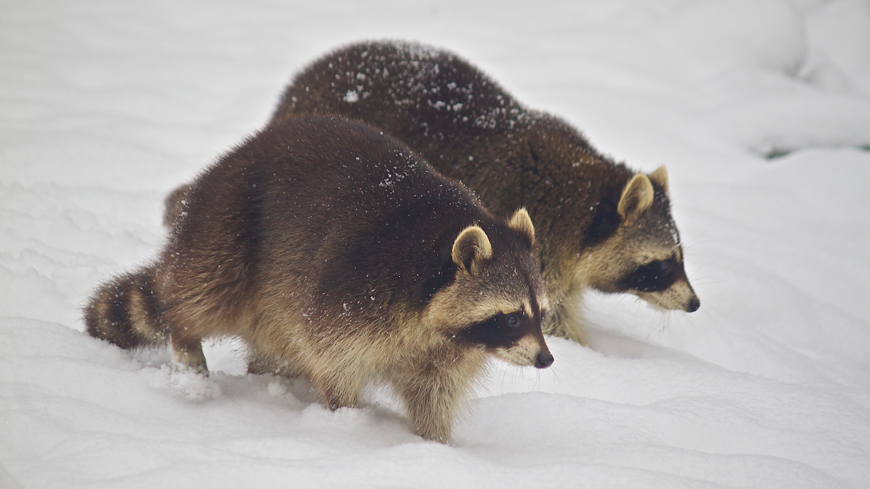Summary
Cat fleas die outdoors in winter. Frost or snow kills fleas. No life stage can survive in freezing temperatures for extended periods. However, adult can stay alive on their warm-blooded hosts, and immature stages can develop in homes or the freeze-protected dens of wildlife. Cat fleas don’t hibernate, despite what some sources claim.

Img 1 Environmental conditions needed for all life stages of the cat flea to survive.
Details
Winter Survival
Fleas Survive Year-Round
Small populations of fleas can be found on domestic and feral animals year-round, even during the coldest months. However, it’s rare for new infestations to begin on dogs and cats during winter. Outdoors, developing fleas can’t survive the cold, arid conditions in most temperate zones. Even in California, few fleas are found from January to April.
A U.K. survey collected fleas from dogs and cats in the winter. Mature eggs were found inside the female fleas, though in low numbers compared to summer months. Females still producing eggs during cold, winter months means that infestations can continue, and populations can eventually explode in warmer seasons.
Some geographic locations have warm, humid climates year-round. In southern Florida, for instance, fleas will continue thriving outdoors through the winter months of November to March. However, even in Florida, low temperatures and low relative humidity limit winter survival.
Don’t Stop Treatments in Winter
The changing of the seasons won’t end a current flea infestation. Stopping flea treatments early when the cool months set in is a common cause of reinfestation.
How Fleas Overwinter
No flea stage can survive in near-freezing temperatures for extended periods Img 1. However, some fleas won’t get subjected to extreme cold. Adults can survive on warm-bodied hosts, such as dogs, cats, and raccoons Img 2. Fleas can also live year-round if their host lives in a warmed shelter. For example, fleas will survive in heated homes, where, consequently, most domestic infestations occur. However, even in homes, populations are lower during winter due to the low relative humidity caused by heating. The frost-protected dens of wild animals can also keep immature fleas alive during winter.

Img 2 Raccoons are active in the winter and fleas can survive on their warm bodies.
Fleas don’t Hibernate
Fleas don’t have a true diapause stage. They don’t hibernate or go dormant to overwinter. Adults can enter a quiescent (inactive) state within their cocoon for up to 5 months, but temperatures below 37.4°F (3°C) kill them. Still, pre-emerged adults can survive winters in slightly warmed or insulated structures (e.g. crawl spaces), and then emerge in spring when conditions are better. They may also live through short, mild winters outdoors.
Cold Temperatures Kill Fleas
Adult Fleas
Adult fleas die in temperatures below freezing Fig 2. Death occurs within five days at 30.2°F (-1°C). Within 24 hours, 20% of emerged adults and 72% of pre-emerged adults will die. They’ll survive longer above freezing (37.4°F), but still ultimately die within 10 days.
Fig 2 Percent of emerged adult fleas that survive (y-axis) across 40 days (x-axis).
When temperatures rise above 46.4°F (8°C), nearly half of emerged adults stay alive for 20 days. However, immature stages can’t survive in these temperatures.
Flea Eggs
Flea eggs die outdoors during winter. They don’t go dormant. The eggs can only survive at or above 55.4°F (13°C). At this temperature, 50% of flea eggs hatch within six days.
Flea eggs hatch in 12 days at 50.4°F (10°C), but the larvae will quickly die. At 46.4°F (8°C), nearly half of the eggs are killed in a day, 65% die by day five, and there’s a complete kill by day ten Fig 3. At 37.4°F (3°C), 65% of the flea eggs die within a day. Survival isn’t possible in subfreezing temperatures.
Fig 3 Percent of eggs that survive (y-axis) across 10 days (x-axis).
Flea Larvae
The larval stage is most susceptible to cold conditions. The low-end extreme occurs at 55.4°F (13°C). Flea larvae die within 10 days of hatching at 50°F (10°C).
Another study found similar results. 59°F (15°C) was the low-end extreme. At 46.4°F (8°C), 65% of the larvae died within 10 days, and 100% by day 20. At 37.4°F (3°C), 37% of the larvae died in a day, and none lived past day five days.
Delayed Development Times
Fleas that survive in winter develop at a slow rate. They take 2-3 times longer to reach adulthood in winter conditions than in ideal spring and fall conditions. Increased development time may be lethal in itself, as young fragile stages are at prolonged risk of unpredictable environmental conditions and predators.




You must log in to post a comment. Log in now.